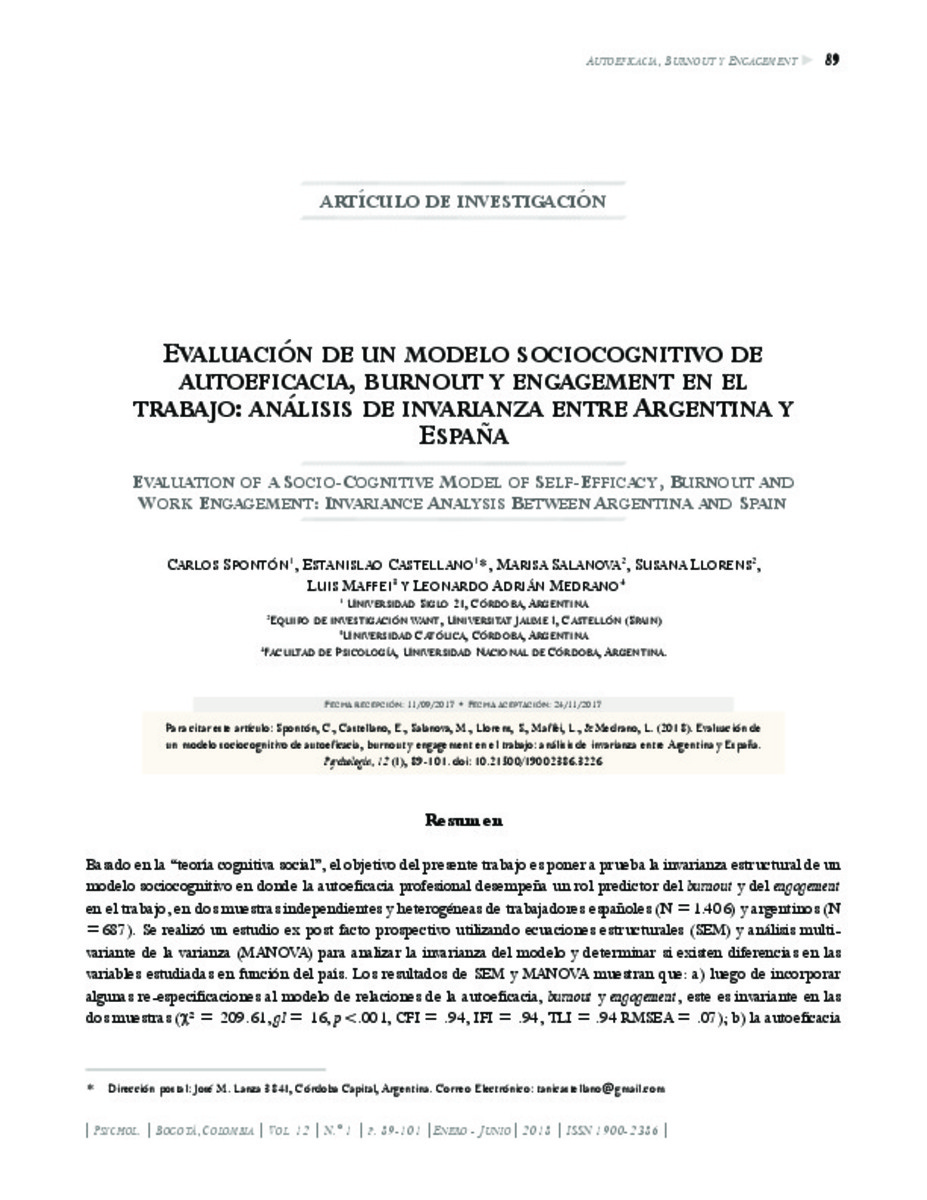Mostrar el registro sencillo del ítem
Evaluación de un modelo sociocognitivo de autoeficacia, burnout y engagement en el trabajo: análisis de invarianza entre Argentina y España
| dc.contributor.author | Spontón, Carlos | |
| dc.contributor.author | Castellano, Estanislao | |
| dc.contributor.author | Salanova, Marisa | |
| dc.contributor.author | Llorens Gumbau, Susana | |
| dc.contributor.author | Maffei, Luis | |
| dc.contributor.author | Medrano, Leonardo Adrián | |
| dc.date.accessioned | 2019-02-20T12:12:28Z | |
| dc.date.available | 2019-02-20T12:12:28Z | |
| dc.date.issued | 2018 | |
| dc.identifier.citation | Spontón, C., Castellano, E., Salanova, M., Llorens, S., Maffei, L., & Medrano, L. (2018). Evaluación de un modelo sociocognitivo de autoeficacia, burnout y engagement en el trabajo: análisis de invarianza entre Argentina y España. Psychologia, 12(1), 89-101. doi: 10.21500/19002386.3226 | ca_CA |
| dc.identifier.issn | 1900-2386 | |
| dc.identifier.uri | http://hdl.handle.net/10234/181393 | |
| dc.description.abstract | Basado en la “teoría cognitiva social”, el objetivo del presente trabajo es poner a prueba la invarianza estructural de un modelo sociocognitivo en donde la autoeficacia profesional desempeña un rol predictor del burnout y del engagementen el trabajo, en dos muestras independientes y heterogéneas de trabajadores españoles (N =1.406) y argentinos (N =687). Se realizó un estudio ex post facto prospectivo utilizando ecuaciones estructurales (SEM) y análisis multi-variante de la varianza (MANOVA) para analizar la invarianza del modelo y determinar si existen diferencias en las variables estudiadas en función del país. Los resultados de SEM y MANOVA muestran que: a) luego de incorporar algunas re-especificaciones al modelo de relaciones de la autoeficacia, burnout y engagement, este es invariante en las dos muestras (χ² = 209.61, gl =16, p<.001, CFI = .94, IFI = .94, TLI = .94 RMSEA = .07); b) la autoeficacia profesional tiene una influencia negativa sobre el corazón del burnout (βArgentina = -.25 y βEspaña = -.22, p < .001) y positiva con el corazón del engagement (βArgentina = .34 y βEspaña = .41, p < .001), y c) existen diferencias significativas en función del país, mostrando en los trabajadores argentinos puntuaciones significativamente más altas en autoeficacia (F=107.13, p<.001). Los resultados corroboran la importancia de las creencias de autoeficacia sobre el burnout y engagement tanto en Argentina como en España. | ca_CA |
| dc.description.abstract | Building upon Social Cognitive Theor y, the purpose of the current study was to test a model in which self-efficacy beliefs influence job burnout and engagement, and to examine its invariance across Spanish (n = 1406) and Argen-tinean (n = 687) employees from private and public sectors. A prospective expo facto study was carried out, using a structural equation model (SEM), and analyzes were also carried out on the internal consistency of the scales (αCronbach) and MANOVA to analyze differences in the variables studied according to the countr y. The results of SEM and Analysis of Variance show that: (a) after incorporating some respecifications into the relationship model of self-efficacy, burnout and engagement, this is invariant in the two samples (χ² = 209.61, gl = 16, p <. 001, CFI = .94, IFI = .94, TLI = .94 RMSEA = .07); (b) professional self-efficacy has a negative and significant influence on the heart of burnout (β Argentina = -.25 and β Spain = -.22, p <.001), while the influence is significant and positive with the heart of the engagement (β Argentina = .34 and β Spain = .41, p <.001). while it is positively associa-ted with engagement levels, regardless of the countr y; (c) there are significant differences according to the countr y, showing the Argentine workers scores significantly higher in self-efficacy (F = 107.13, p <.001). The results show that self-efficacy influences both burnout and engagement and this is maintained in both countries | ca_CA |
| dc.format.extent | 13 p. | ca_CA |
| dc.format.mimetype | application/pdf | ca_CA |
| dc.language.iso | spa | ca_CA |
| dc.publisher | Universidad de San Buenaventura | ca_CA |
| dc.relation.isPartOf | Psychologia, 12(1), 2018 | ca_CA |
| dc.rights | Esta obra está bajo licencia internacional Creative Commons Reconocimiento-NoComercial-CompartirIgual 4.0. | ca_CA |
| dc.rights | Atribución-NoComercial-CompartirIgual 4.0 Internacional | * |
| dc.rights.uri | http://creativecommons.org/licenses/by-nc-sa/4.0/ | * |
| dc.subject | Autoeficacia | ca_CA |
| dc.subject | burnout | ca_CA |
| dc.subject | engagement | ca_CA |
| dc.subject | trabajadores | ca_CA |
| dc.subject | invarianza | ca_CA |
| dc.subject | self-efficacy | ca_CA |
| dc.subject | burnout | ca_CA |
| dc.subject | engagement | ca_CA |
| dc.subject | worker | ca_CA |
| dc.subject | invariance | ca_CA |
| dc.title | Evaluación de un modelo sociocognitivo de autoeficacia, burnout y engagement en el trabajo: análisis de invarianza entre Argentina y España | ca_CA |
| dc.type | info:eu-repo/semantics/article | ca_CA |
| dc.identifier.doi | https://doi.org/10.21500/19002386.3226 | |
| dc.rights.accessRights | info:eu-repo/semantics/openAccess | ca_CA |
| dc.relation.publisherVersion | https://revistas.usb.edu.co/index.php/Psychologia/article/view/3226 | ca_CA |
| dc.type.version | info:eu-repo/semantics/publishedVersion | ca_CA |
Ficheros en el ítem
Este ítem aparece en la(s) siguiente(s) colección(ones)
-
PSI_Articles [589]
Articles de publicacions periòdiques








